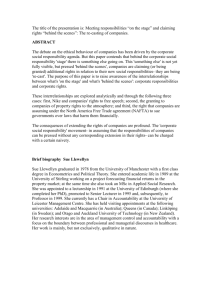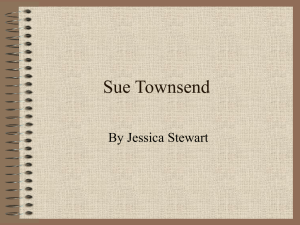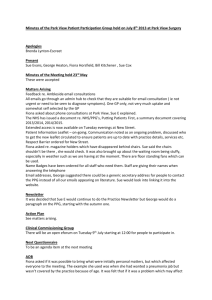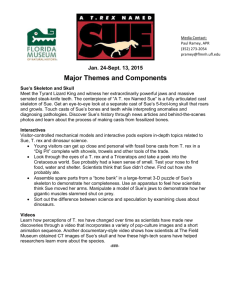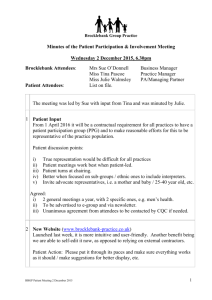MCC syllabus - American Counseling Association
advertisement
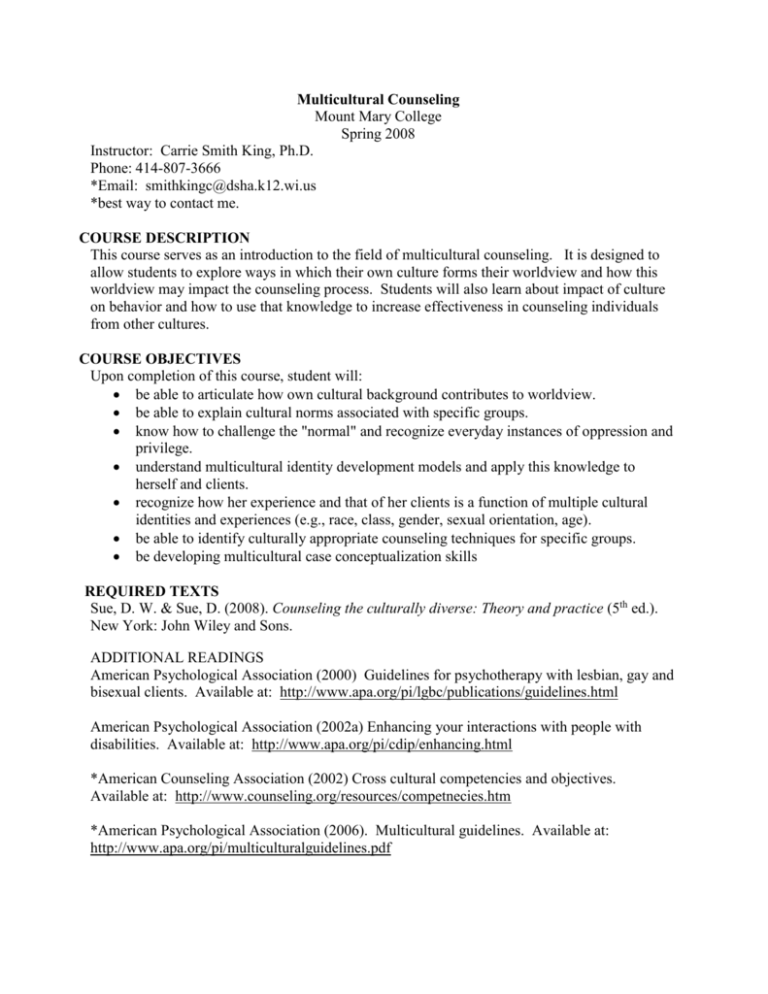
Multicultural Counseling Mount Mary College Spring 2008 Instructor: Carrie Smith King, Ph.D. Phone: 414-807-3666 *Email: smithkingc@dsha.k12.wi.us *best way to contact me. COURSE DESCRIPTION This course serves as an introduction to the field of multicultural counseling. It is designed to allow students to explore ways in which their own culture forms their worldview and how this worldview may impact the counseling process. Students will also learn about impact of culture on behavior and how to use that knowledge to increase effectiveness in counseling individuals from other cultures. COURSE OBJECTIVES Upon completion of this course, student will: be able to articulate how own cultural background contributes to worldview. be able to explain cultural norms associated with specific groups. know how to challenge the "normal" and recognize everyday instances of oppression and privilege. understand multicultural identity development models and apply this knowledge to herself and clients. recognize how her experience and that of her clients is a function of multiple cultural identities and experiences (e.g., race, class, gender, sexual orientation, age). be able to identify culturally appropriate counseling techniques for specific groups. be developing multicultural case conceptualization skills REQUIRED TEXTS Sue, D. W. & Sue, D. (2008). Counseling the culturally diverse: Theory and practice (5th ed.). New York: John Wiley and Sons. ADDITIONAL READINGS American Psychological Association (2000) Guidelines for psychotherapy with lesbian, gay and bisexual clients. Available at: http://www.apa.org/pi/lgbc/publications/guidelines.html American Psychological Association (2002a) Enhancing your interactions with people with disabilities. Available at: http://www.apa.org/pi/cdip/enhancing.html *American Counseling Association (2002) Cross cultural competencies and objectives. Available at: http://www.counseling.org/resources/competnecies.htm *American Psychological Association (2006). Multicultural guidelines. Available at: http://www.apa.org/pi/multiculturalguidelines.pdf 2005 American Counseling Association Code of Ethics (available for download at: http://www.counseling.org/Resources/CodeOfEthics/TP/Home/CT2.aspx ) Multicultural Competencies http://www.counseling.org/Counselors/ (Download of multicultural competencies is located at bottom right hand side of this online page). Can click on and then print PDF file from there. Orlando, T. L. (1987 ). "Cross-Cultural Communication: An Essential Dimension of Effective Education". Chevy Chase, MD: The Mid Atlantic Center www.maec.org/cross/index.html FINAL COURSE GRADE 1. Exploring Ethnicity paper 30 points 2. Reaction paper 30 points 3. Review of Research 15 points 4. Presentation of Chapter 15 points 5. Attendance and Participation 10 points Total possible = 100 points 95-100 91-94 7-90 83-86 =A =AB =B =BC 79-82 75-78 70-74 69 or Below =C =CD =D =F COURSE ASSIGNMENTS Exploring Ethnicity Paper. The purpose of this assignment is for you to examine your own ethnic/racial background. This can lead to a greater awareness of how your own individual development, experience and worldview have been affected by your ethnic and/or racial identity within your family, community, and the larger society. In a paper of about 9-11 pages, discuss the following issues related to your ethnicity: 1. Description of your own ethnic background (it may be a mixture, such as Norwegian and Polish or French and Ethiopian; decide if you want to include more than one or just focus on one ethnic background). You may use a genogram for this portion of the paper. 2. History of people from your same ethnic background coming to the USA ; where they came from; when and why they came-were they immigrants or refugees, motivated by dreams of a better life or running from oppression or poverty; the journey to this country, including any circumstances you consider significant. You may focus on your family's particular circumstances or the more general circumstances of others of this ethnic group from your family's country of origin. 3. Reception of people from your same ethnic background by other Americans-- to what degree were there immigration policies, restrictive or exclusionary policies which affected the opportunities of the newcomers? To what degree did they encounter discrimination or encouragement in their new communities? 4. For this ethnic group(s), was there a time in which their ethnicity became less important? Explain. 5. Aspects of that ethnic background that are salient or important to your family and you; what features, such as the humor, the food, family relations, patterns of communication and childrearing, etc. contribute to your way of thinking and being and those of others of your ethnic background? 6. What strengths do you have that can be traced to your ethnic background? (In some cases, these may be best observed through family values) 7. Synthesizing the six sections above, examine your personal worldview using a relevant model of racial/identity development (see Sue & Sue). Due March 6th. Please be prepared to give a 10 minute overview of your paper. Review of Research. Using American Psychological Association (APA) guidelines, write three summaries and critiques on research articles (must be empirical research meaning that data was collected and analyzed), from psychological or human service journals on multicultural or crosscultural counseling. Your format (one single spaced page per review) should be as follows: article citation, purpose of study, methodology, results/conclusions, critique. Due April 3rd. Reaction Paper. In order to write this paper, you will need to do at least two things. First, put yourself in a new situation in which you are an outsider. This may involve going to a church/religious service that people "like you" don't normally attend, a festival or social event largely attended by people "unlike you." You will also need to keep a daily journal for three weeks, in which you write down incidents in which you were aware of race, being an outsider, and privilege (specifically, white skin privilege if you identify as “Caucasian”). In a paper of about eight pages, discuss the following: Part I – new situation: Describe the event and you experience. What were your feelings/emotions as you put yourself in the new situation? How was that similar to and different than other times when you have been in the minority, or only one of a few people like you in a situation? Part II – journal: In those three weeks, how often and in what kinds of situations did race appear in your daily life? Reflect on how your own group membership, race, and other factors influenced the ways race was apparent. What were the common themes about race that appeared during these weeks? Discuss the meanings of these themes. What were the aspects of (white) privilege that you observed or experienced? In your opinion, what were reasons why these occurred in those situations? Were there other kinds of privilege other than white privilege that you observed? If so, discuss these. Part III – synthesis: What did you learn about society/race/minority status, etc. as a result of doing this paper? What did you learn about yourself as a result of doing this paper? The paper will be graded on thoroughness in answering the questions, analysis of issues experienced and observed, and clarity of the paper (well organized, well written). Please provide evidence of your “outsider” experience (receipt, bulletin, etc., with a current date on it) and turn in your journal with the paper. All journal entries are kept confidential in accordance with APA guidelines. Due May 8th. Please be prepared to give a 10 minute overview of your paper. All work turned in is to be computer generated and follow APA guidelines. Information about APA style may be found at www.apa.org or www.wisc.edu/writing/Handbook/DocAPA.html or the fifth edition of the APA style manual. TENTATIVE SCHEDULE January 24th Course introduction Sue & Sue Ch. 1 & 2 st January 31 Defining culture and worldview Sue & Sue Ch. 9 &12 Genograms Lee & Armstrong handout th February 7 Barriers to multicultural counseling Sue & Sue Ch. 4, 5 & 6 February 14th Video: “Skin Deep” White privilege Sue & Sue Ch. 10 February 21st White Identity model Invisible Knapsack handout Racial Identity models Sue & Sue Ch.11 February 28th Social class and counseling implications *ACA/*APA competencies Video: “People like Us” and guidelines March 6th Culturally appropriate strategies Sue & Sue Ch. 7 Exploring Ethnicity Paper due th March 13 Counseling LGBT Sue & Sue Ch. 23 People with disabilities Sue & Sue Ch. 26 rd April 3 Counseling Black Americans Sue & Sue Ch. 14 ________________________ ___________________________ Review of Research due April 10th Counseling American Indians Sue & Sue Ch. 15 ________________________ ___________________________ April 17th Counseling Asian Americans Sue & Sue Ch. 16 ________________________ ___________________________ April 24th Counseling Hispanic Americans Sue & Sue Ch. 17 ________________________ ___________________________ May 1st Counseling Arab Americans Sue & Sue Ch. 19 Counseling Ind. of Multiracial Decent Sue & Sue Ch. 18 ________________________ ___________________________ May 8th Multicultural Family Counseling Sue & Sue Ch. 8 Reaction Paper due IMPORTANT NOTES REGARDING THE CLASS Late Policy: All work must be completed for a passing grade. Generally, deadlines will not be excused . Work not received on the due date will result in a reduction of a letter grade (90% of the available points). Requests for extensions must be submitted at least 24 hours before the due date. Attendance & Active Participation. Students are expected to attend every class. Please inform me ahead of time if you will be unavoidably late or absent from class. In class discussions, role playing and exercises are expected in addition to the reading material and handouts. Given the sensitive and challenging nature of the material discussed in class (racism, sexism, homophobia, ageism, abilism), it is imperative that there be an atmosphere of trust and safety in the classroom. I will do my best to provide an environment in which we are able to hear and respect each other, and it is critical that each class member show respect for all worldviews expressed in class. It is expected that some of the material in this course may evoke strong emotions, please be respectful of others emotions and be mindful of your own. Please let me know if something said or done in the classroom is particularly troubling. Some students find it helpful to journal their thoughts and feelings as they explore these sensitive issues. Courtesy Note: Please turn off cell phones and pagers or turn them to vibrate so that they do not disrupt the other students. If you need to take a call or are “on call” for your job, please step into the hall to speak into the phone. Disability Statement: Mount Mary College complies with Section 504 of the Rehabilitation Act of 1973, which stipulates that the College will make reasonable accommodations for persons with documented disabilities. If you have a disability that may have some impact on your work in this class and for which you may require accommodation, please see me and the Coordinator of Disability Services (NDH 152) so that such accommodations may be arranged. If anyone needs class-room accommodations for a disability, please let me know in private, as soon as possible. All students will demonstrate behavior that is consistent with the Ethical Standards forwarded by the American Psychological Association (APA) and the American Counseling Association (ACA). Please do not wait until the last week of the semester to let the instructor know if you are struggling meeting the course requirements or are having any significant problems that may impact your ability to complete the assignments or comprehend the material. Academic Honesty and Integrity Mount Mary College is an academic community dedicated to the intellectual and social and ethical development of each of its members. As members of this community we all are responsible for maintaining an atmosphere of mutual respect and honesty. Standards for academic integrity provide a structure for the creation of an academic environment consistent with the values of the School Sisters of Notre Dame and the mission of the College. In keeping with these goals, all students are expected to strive for integrity, in academic and nonacademic pursuits. Acts that involve any attempt to deceive, to present another’s ideas as one’s own, or to enhance one’s grade through dishonest means violate the integrity of both the student and College. Academic dishonesty in any form has a negative impact on the essential principles of the Mount Mary College Community. Therefore, such acts are treated as a serious breach of trust. A faculty member has the right and authority to deal with academic dishonesty in his or her classroom; however, a student who commits multiple violations against academic integrity shall be subject to administrative disciplinary action. Copies of the full Academic Honesty and Integrity Policy and Procedures are available through the office of the Associate Dean for Academic Affairs. The policy and procedures are included in the Mount Mary College Student Handbook, the Undergraduate Bulletin and online at mtmary.edu/handbook.htm and my.mtmary.edu
